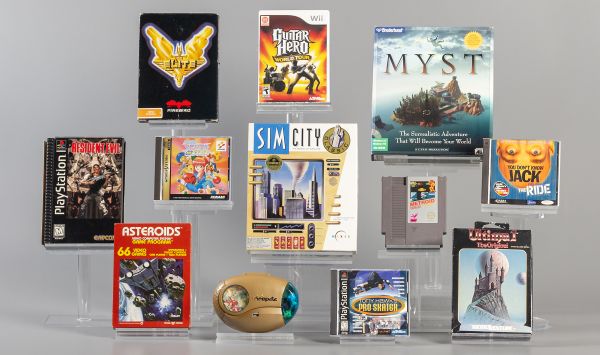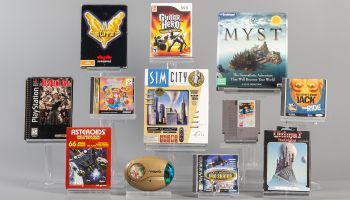
Spring is in the air, and that means it’s time for the curators at the World Video Game Hall of Fame to unveil this year’s ballot of possible inductees. The Class of 2024 will be the tenth to be welcomed into the Hall, and this year’s competition will include a grab bag of previous finalists and a eclectic slate of newcomers.
Leading the pack is a trio of two-time finalists, including Capcom’s Resident Evil (previously up for consideration in 2017 and 2022), Harmonix’s Guitar Hero (2020 and 2021), and Cyan’s Myst (2017 and 2019). All three have a strong case for induction, but they’ll be competing against a few other previous finalists, including Elite (which was a finalist in 2016), Asteroids (2018), and Metroid (2018).
But don’t count out the rookies, who come from some of gaming’s less-crowded corners. There’s a browser-based classic from the early 2000s (Neopets), the original city builder (SimCity), an early dating simulation (Tokimeki Memorial), a big name in extreme sports (Tony Hawk’s Pro Skater), Richard Garriott’s groundbreaking RPG (Ultima), and the chaotic trivia game that inspired the Jackbox franchise (You Don’t Know Jack).
“Even ten years in, there’s no shortage of deserving contenders that have had enormous influence on pop culture or the game industry itself,” said Jon-Paul Dyson, the Director of the Hall of Fame’s parent organization, the International Center for the History of Electronic Games at the Strong Museum. “These games span decades. Asteroids is an icon of the late 70s arcade. Myst showed the potential of CD-ROM technology in the 90s. Neopets became a staple of browser-based, free games as we entered the 2000s. And Guitar Hero, which is less than 20 years old, has already proven its staying power.”
As always, the World Video Game Hall of Fame is opening up the voting to the general public between now and March 21. Make your choice at WorldVideoGameHallOfFame.org, and the three games that receive the most votes will be submitted as a Player’s Choice ballot alongside the other ballots from the Hall of Fame’s International Selection Advisory Committee.
The World Video Game Hall of Fame’s Class of 2024 will be announced on Thursday, May 9, at 10:30 AM (Eastern Time). And if you’re unfamiliar with any of this year’s finalists, you can learn more about them after the break.
Meet the 2024 World Video Game Hall of Fame Finalists
Asteroids: Released in 1979, Atari’s Asteroids offered players challenging gameplay, glowing graphics, and intense sound effects in an action-packed space setting. The game quickly supplanted the popular Space Invaders in many arcades and sold more than 70,000 arcade units, becoming Atari’s bestselling coin-operated game. The home version of the game—made available on the Atari 2600—took the game’s popularity to new heights, bringing it into millions of living rooms.
Elite: Developed in Great Britain and released in 1984, Elite pioneered innovative 3-D graphics and the idea of open-world games by allowing players to control ships that roamed the galaxy. The expansive universe and strategy elements helped to spawn a generation of games with endless play possibilities, such as Grand Theft Auto 3 and Eve Online. Elite proved to be one of the most popular games of the British personal computer boom in the 1980s, and it dramatically impacted the design of other games.
Guitar Hero: Launched in 2005, Harmonix’s Guitar Hero challenged players to unleash their inner rock star by following on-screen notes and strumming to the beat of popular music on a plastic guitar. Its wide appeal, licensed music, and social gameplay spawned other similar titles, including the popular Rock Band. Activision, which acquired the game’s rights, released versions of Guitar Hero for nearly every platform, including home consoles, computers, and handheld and mobile devices. The Guitar Hero series has sold more than 25 million units worldwide and more than 60 million tracks, earning more than $2 billion.
Metroid: Nintendo’s Metroid launched in 1986 and inserted players into a futuristic world brimming with innovative adventure and evocative music. The game combined the platforming of Nintendo’s Super Mario Bros. and non-linear story elements from The Legend of Zelda, offering a new game play experience. The protagonist, Samus, also gave the gaming industry its first playable human female character in mainstream video games. The game launched a franchise with 13 core titles that has sold more than 20 million units worldwide.
Myst: Released by Broderbund in 1993,Myst welcomed players to a mesmerizing world of mysterious puzzles and haunting vistas. The gameharnessed early CD-ROM technology—which offered high storage capacity but slow loading times. The discs paired well with the slow-paced, contemplative style of the game, though, and allowed the creation of an immersive world. Myst became the best-selling computer game in the 1990s, selling more than six million copies.
Neopets: When Neopets debuted in 1999, it quickly became a staple of browser-based, free-to-play games. The online world of Neopia allows its players to explore various lands, care for pets, and engage in a robust social component, complete with opportunities to chat with other players and form guilds. Neopets also showcased the potential of the Internet for gaming and served as a testing ground for cyber safety mechanisms and immersive advertising. At its peak in 2005, Neopets had 25 million active users, and it continues to be popular more than two decades later.
Resident Evil: Although it wasn’t the first horror video game, Resident Evil (or Biohazard as it was known in Japan) was the first game to popularize the “survival horror” genre. Created by game director Shinji Mikami and released by Capcom in 1996, Resident Evil spawned a billion-dollar media franchise while it helped demonstrate that video games could offer mature entertainment for older teenagers and adults. As of 2022, films based on the Resident Evil franchise have collective grossed more than $1.2 billion.
SimCity: Released by Maxis in 1989, SimCity helped expand the audience for video games by offering a city building simulator that appealed to adults as much as children. Drawing from real-life principles of urban design, it allowed players to build their own city and respond to ever-changing problems. The game spawned numerous sequels and offshoots—such as World Video Game Hall of Fame inductee The Sims—and influenced the development of many city-building simulation games and even real-time strategy games, like Command and Conquer and Age of Empires.
Tokimeki Memorial: Konami’s Tokimeki Memorial brought a cohesive narrative, colorful graphics, unparalleled depth of choices, and engaging gameplay to the dating simulator genre after its launch in 1994. While it was never localized outside Japan, its impact on game design was widespread, paving the way for graphic adventure games, visual novels, dating sims, and roleplaying games to invest more in personal relationships as part of their gameplay loop.
Tony Hawk’s Pro Skater: Launched by Neversoft/Activision in 1999, Tony Hawk’s Pro Skater brought the sport and culture of skateboarding into millions of households. Players flew from ramps and jumps, using the environment as a playground to bust out high-point tricks, all with a memorable soundtrack. The legendary Tony Hawk himself said the game “simultaneously ignited my career and overshadowed it.” Its success led to sequels that have generated approximately $1.4 billion in sales.
Ultima: Ultima: The First Age of Darkness helped define the computer role-playing genre. Designed by Richard Garriott and released in 1981, Ultima combined role-playing mechanics, a massive fictional world, and fantasy and science fiction themes. Ultima’s innovative gameplay laid the foundation for one of the most enduring and influential gaming franchises of all time (with eight sequels). Many top game designers credit it with inspiring their later role-playing games, such as Dragon Quest and Final Fantasy.
You Don’t Know Jack: The developers of You Don’t Know Jack reimagined the television game show format for home video game markets. Debuting in 1995, You Don’t Know Jack combined witty questions with humor in a multi-player party game. Sequels and spinoffs continue to find success on Facebook and mobile platforms, and steaming versions were extremely popular in the early days of the COVID-19 pandemic.

